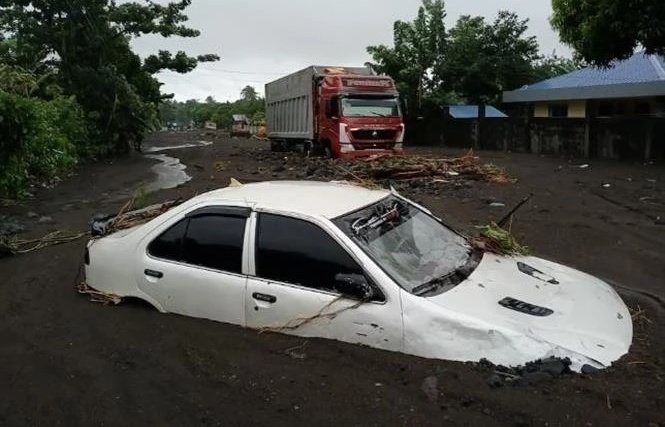Survivors recall horror of Indonesia boat disaster

Seventeen-year-old Afghan student Samin Gul Afghani broke down in tears as he described seeing his uncle and two younger brothers sink exhausted under the waters.
Afghani, one of 13 survivors found Monday 100 kilometres (60 miles) from Saturday's capsize, recalled seeing dozens of fellow migrants drowning as they waited in vain to be rescued.
"Many people did not know how to swim and were sitting on a large plank of wood from the wreckage. When the waves hit one side, we shifted to the other," recounted Afghani, receiving medical treatment together with a handful of other survivors at a hospital in Lumajang city in Indonesia's East Java province.
"One by one, they were swept away by the waves and drowned. Many were old people and young children," he added.
His uncle and two brothers were non-swimmers, Afghani said.
"They died in front of my eyes. I could do nothing to save them," he said, sobbing.
Survivors said that most of the roughly 250 migrants on the doomed boat were Afghans or Iranians.
"People-smugglers first brought me to Indonesia. From here, I got on the boat at around 3:00 am on Saturday," said 25-year-old Syed Ghasem, another Afghan.
"I was on one of four buses loaded with people like me who were trying to get to Australia," he said. "Six hours into the (sea) journey we were in a very, very violent storm, and the next thing I knew the boat had capsized."
Ghasem said that about 50 survivors managed to climb onto the large plank of wood, but many were lost when it broke apart.
"Thirteen of us managed to hang on, and we were adrift for three days and two nights before being picked up by a ferry," Ghasem said.
So far, 47 survivors have been rescued after the fibreglass vessel, which had a capacity of 100 but was carrying about 250 migrants, sank 40 nautical miles off eastern Java.
Thirty-four of them were plucked from shark-infested waters on Saturday by fishermen six hours after the sinking and are now being formally identified by the International Organization for Migration.
Crew members and migrants had wrestled over 25 life vests on the doomed boat, officials and survivors said.
Officials said they were trying to establish whether two Indonesians found Monday near eastern Java's Malang city were crew members. One of the Indonesians told AFP he was a fisherman.
Search operations resumed Tuesday despite slim chances of finding anyone alive, East Java provincial Disaster Management Agency chief Siswanto told AFP.
The capsize was considered the "largest loss of life" yet from the sinking of one of the many boats packed with Asian and Middle Eastern migrants who undertake the perilous sea voyage from Indonesia to Australia.
Survivors said they were heading to Australia's Christmas Island, a favoured destination for people-smugglers, lying closer to Indonesia than Australia. Nearly 50 would-be migrants are believed to have died in wild seas during a shipwreck there in December 2010.
Nine asylum-seekers died last month when their boat sank in Indonesian waters.
"There was nothing for us. We didn't eat, we didn't drink. We were so thirsty. We thought we were going to die," Afghani said.
"One Iranian tried to swim to shore and get help. He never came back."
Afghani said he saw rescuers on two boats on Sunday but were disappointed when they turned back.
"They couldn't get to us because the waters were very disturbed, very big waves," he said.
Australia's Home Affairs Minister Jason Clare on Monday said Indonesia had requested help from Australian police to investigate people-smugglers, who he said had showed a "callous disregard for human life".
The Australian newspaper reported Monday that a principal suspect responsible for sending the latest boat was an associate of the jailed kingpin Sayed Abbas, whom Australia is pursuing for extradition from Indonesia.
What the stars mean:
★ Poor ★ ★ Promising ★★★ Good ★★★★ Very good ★★★★★ Exceptional
 Tag:
Tag:
Related Contents
Latest News
More News
- Thailand asks Laos to waive visa fee at border checkpoints to boost tourism (October 21, 2024 | 17:23)
- Laos pledges to continue efforts to empower girls (October 21, 2024 | 17:17)
- Chinese electric vehicle maker to build plant in Indonesia (October 21, 2024 | 17:12)
- Vietnam Elevator Association introduces Elevator Safety Application to the world (October 18, 2024 | 09:00)
- A taste of the future - the go-to spot at the Worldchefs Congress & Expo 2024 (October 15, 2024 | 16:11)
- Jakarta to impose household waste levy (October 14, 2024 | 16:49)
- China, Laos plan to build connectivity development corridor with Thailand (October 14, 2024 | 16:19)
- Singapore keeps monetary policy unchanged (October 14, 2024 | 16:00)
- Indonesia aims to become key chain in global EV industry (October 14, 2024 | 15:59)
- RoK, Singapore to deepen AI, defence cooperation (October 09, 2024 | 16:18)





















 Mobile Version
Mobile Version